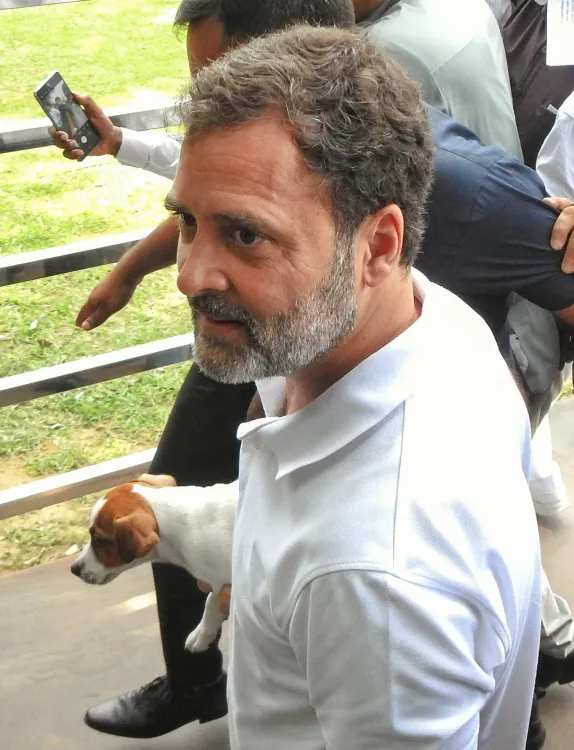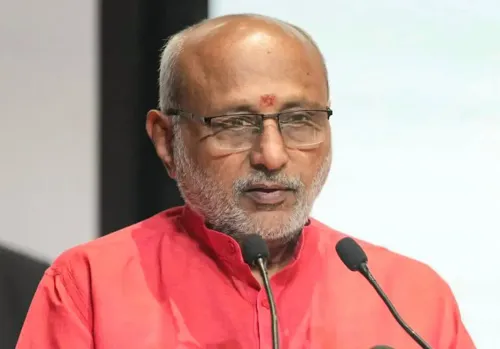Is the Supreme Court's directive on stray dogs a step backward?

Synopsis
Key Takeaways
- Supreme Court's order mandates removal of stray dogs from Delhi-NCR.
- Rahul Gandhi emphasizes humane treatment over removal.
- Animal rights activists express concerns about resource availability.
- Relocation may disrupt existing dog populations and vaccination efforts.
- Community care and sterilization are advocated as humane solutions.
New Delhi, Aug 12 (NationPress) Congress MP and Leader of the Opposition in the Lok Sabha, Rahul Gandhi, expressed his concerns on Tuesday regarding the Supreme Court’s order to remove all stray dogs from Delhi-NCR, describing it as a regressive move away from decades of humane, science-based policies.
In a post on the social media platform X, Gandhi stated, “The SC’s order to remove all stray dogs from Delhi-NCR signifies a step back from decades of humane, evidence-based policy.”
He further emphasized, “These voiceless beings should not be seen as ‘issues’ to be eliminated. Alternatives like shelters, sterilization, vaccination, and community care can ensure public safety without cruelty. Arbitrary removals are inhumane, shortsighted, and rob us of our compassion. It is possible to balance public safety with animal welfare.”
The Supreme Court’s directive, issued on Monday, instructs local authorities in Delhi-NCR to promptly capture all stray dogs and transfer them to shelters. The Bench, led by Justices J. B. Pardiwala and R. Mahadevan, termed the situation as “grim,” voicing serious concern for public safety, particularly for vulnerable groups like children and the elderly at risk of dog attacks.
This order impacts the Municipal Corporation of Delhi (MCD), New Delhi Municipal Council (NDMC), and civic authorities in Noida, Gurugram, and Ghaziabad. These organizations are mandated to initiate the removal of stray dogs from their areas and place them in designated shelters. Where shelters do not currently exist, authorities must establish them immediately and provide a detailed report on their infrastructure within eight weeks.
The Bench issued a clear warning that any organization or individual hindering the removal of stray dogs will face significant legal repercussions.
The situation arose amid increasing public concern regarding the growing problem of stray dogs in urban settings. Solicitor General Tushar Mehta urged the court to implement robust preventive strategies to combat the rising threats of rabies and attacks on pedestrians.
This Supreme Court ruling has ignited a heated debate online and within the public sphere. While Resident Welfare Associations have welcomed the directive, numerous animal rights activists argue that local authorities lack the necessary land, funding, and resources to effectively conduct such a large-scale operation.
They caution that hurried removals, without thorough plans, could worsen the conflict between humans and dogs.
As large-scale protests erupted at India Gate, the Delhi Police detained animal rights activists, rescuers, and dog lovers who were demonstrating against the Supreme Court ruling.
The Federation of Indian Animal Protection Organisations (FIAPO) deemed the order “shocking,” raising various concerns and potential legal violations related to the ruling.
“The recent Supreme Court ruling mandating the relocation of all street dogs in Delhi-NCR is a disturbing decision that contradicts global public health standards, India's own laws, and humane, evidence-based practices,” stated a FIAPO official.
“Relocation disrupts existing vaccination efforts, disbands stable, disease-resistant dog populations, and triggers the ‘vacuum effect’ where unvaccinated dogs quickly occupy the void,” FIAPO added.
Additionally, the top court's directive violates national legislation, specifically the Animal Birth Control Rules of 2003. This law aligns with WHO recommendations, which stipulate that dogs should return to their original territories post-vaccination and sterilization.
PETA also released a statement highlighting that “instead of squandering time, effort, and public funds on ineffective and inhumane displacement drives, a robust sterilization program remains the vital solution. Other crucial measures include closing illegal pet shops and breeders contributing to animal abandonment and encouraging the public to adopt dogs in need from shelters or off the streets.”









